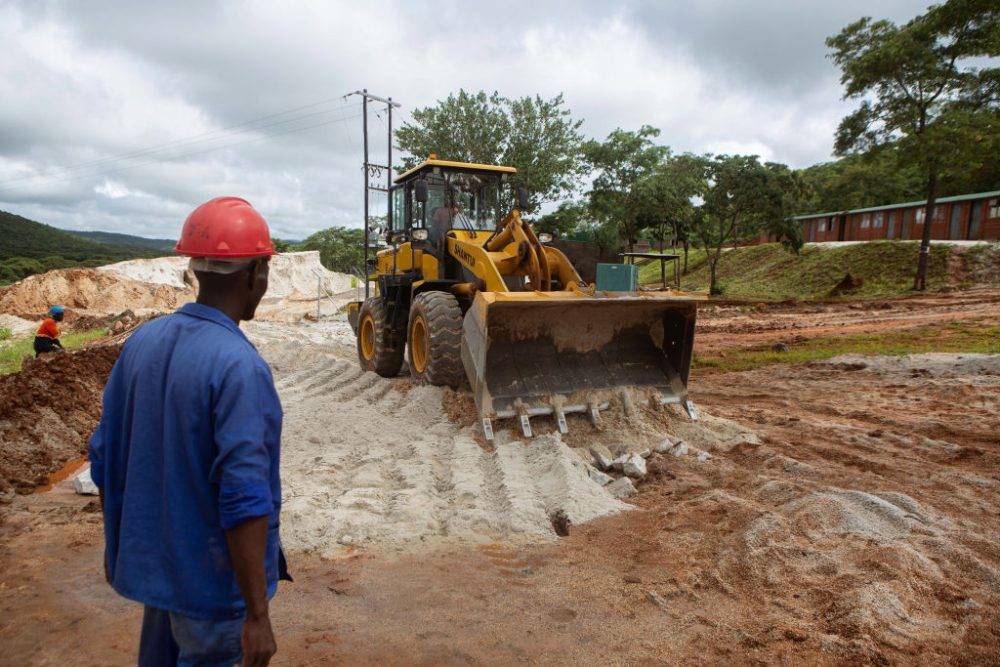
A foreman looks on as a bulldozer works on the slippery road at Arcadia Lithium in Goromonzi, Zimbabwe. (File photo by Tafadzwa Ufumeli/Getty Images)
The number of conflicts disrupting or halting the mining of critical minerals, such as copper and lithium, is putting the energy transition required to combat climate change at risk, researchers have warned in a new study.
The analysis from the Institute of Development Studies showed that there were more than 36 000 mineral mining-related conflict events across 4 293 locations worldwide between 2015 and 2022. This is up to seven times higher than previously recorded.
These conflict events between local populations, mining companies and governments range from verbal disputes to outbreaks of violence and pose a huge risk to the clean energy transition worldwide. This can lead to long-term disruption and delay of billions of dollars’ worth of investment in mineral activities.
“The first thing we discovered is that resistance to mining is not confined to any one region or income group. The presence of mineral deposits, not a country’s level of development, is the key factor in predicting where resistance occurs. It’s everywhere,” said Anabel Marin, a research fellow at the institute and co-author of the study.
“Secondly, we found that these conflicts weren’t just verbal debates — over 60% of conflicts involved deeply entrenched disputes involving protests, blockades and even violence.”
The evidence suggests that the effects of this resistance might be more significant than recognised.
“Many conflicts in our database are highly polarised and research shows that once conflicts reach this stage, they are difficult to reverse, often resulting in long-term disruptions or cancellations and potentially sparking broader anti-mining movements across regions,” the study noted.
While struggles over decision-making and human, social and environmental concerns are present in reported conflicts, economic and distributive issues remain prominent. This contradicts other recent research that overemphasises resistance based on non-economic values.
The study uses open-source data to produce a first-of-its-kind map showing the occurrences of mining-related resistance and conflicts in countries across all continents — not only in low- and middle-income countries.
Conflicts are widespread across all continents and tend to increase in countries with more mineral deposits, the analysis found.
“Countries rich in critical minerals, particularly Australia, the USA, Canada and China, are notably conflict prone. Also the Philippines, Indonesia, Brazil, Chile, Peru, Ghana and Tanzania have more conflicts than expected for its deposits.”
These conflicts are not confined to poorer regions or countries. The authors found no significant correlation between GDP per capita and the number of conflict events or locations, saying this challenges the assumption that conflicts are more frequent in poorer countries with weaker institutions and less capacity to address local populations’ demands.
The conflicts usually arise when governments or mining companies do not respond to, or suppress — sometimes using violence — the problems that local populations have with mines, which are often centred around significant environmental and social justice concerns and health risks. This leads to the delay or cancellation of mining projects.
Conflict-related disruptions can be extraordinarily costly for companies and governments, with some estimates suggesting up to $20 million a week lost.
The study noted how, as the world transitions to a low-carbon economy, the demand for critical minerals, such as copper, lithium and nickel, is expected to rise significantly, with some projections suggesting increases of up to four times by 2040.
This surge in demand presents significant challenges for both the countries aiming to lead the energy transition and for those supplying these minerals.
Current production meets only a fraction of projected mineral demand, with existing and planned projects expected to fulfil just half of lithium and cobalt needs and 70% of copper requirements. Moreover, processing is heavily concentrated in a few countries, notably China, the authors said.
This concentration has spurred investment and policy responses, such as the EU’s Critical Raw Materials Act and the US’s Inflation Reduction Act, aimed at expanding production and securing access.
“Meanwhile, the environmental impacts and risks of mining, such as soil, air and water contamination as well as water-intensive processes threatening agriculture and food security, remain significant concerns,” the study said.
To address these effects, initiatives such as the Responsible Mining Index and the Consolidated Mining Standard Initiative aim to promote responsible practices, while new technologies, such as seawater desalination and direct lithium extraction, are being explored to reduce environmental harm.
But one critical question remains overlooked: “What happens if local populations reject the expansion of mineral extraction?” This possibility is often underestimated, poorly understood and inadequately addressed.
“Yet, as this paper suggests, such resistance could undermine the entire energy transition … Our evidence and analysis suggest that widespread resistance to mineral extraction raises critical concerns, not only about the justice of the energy transition, but also about its legitimacy and viability in a democratic world.”
The authors said they interpret this as indicating a new kind of sustainability problem associated with the energy transition — one that is social and political as much as environmental.
“A key issue is how to integrate diverse actors into policy, economic and investment decisions about mineral resources and, more broadly, about shared resources.”
Large-scale projects that rely on common resources and deeply affect the lives of people living near mining areas need to be negotiated in new ways, the authors said.
“This may signal a far-reaching challenge that has emerged alongside the environmental crisis and the expansion of the green transition — public opposition to economic activities that depend on common resources, including clean energy projects, which will require vast amounts of them.”
In this context, the authors said that ideas of economic democracy — focusing on redistributing economic authority within corporations, among governments and with affected communities — deserve more serious consideration, “not only for social justice but also to enhance our capacity to address these overlapping crises in a democratic world”.
The alternative is concerning, they warned — a future where resistance to these projects leads to a significant slowdown in progress or “shifts environmentally damaging activities to authoritarian regimes, where extraction is imposed by force”.
Without effective agreements across social groups, especially in countries under economic pressure and reliant on these industries for stability, an “expansion of authoritarianism becomes more likely, with governments increasingly using force to push such projects forward unchallenged”.
The research recommends that mining companies and governments need to provide mechanisms that give affected communities a real stake in decision-making, to enable more socially and environmentally just mining, avoid further conflicts and loss of investments, and to enable the energy transition required.



